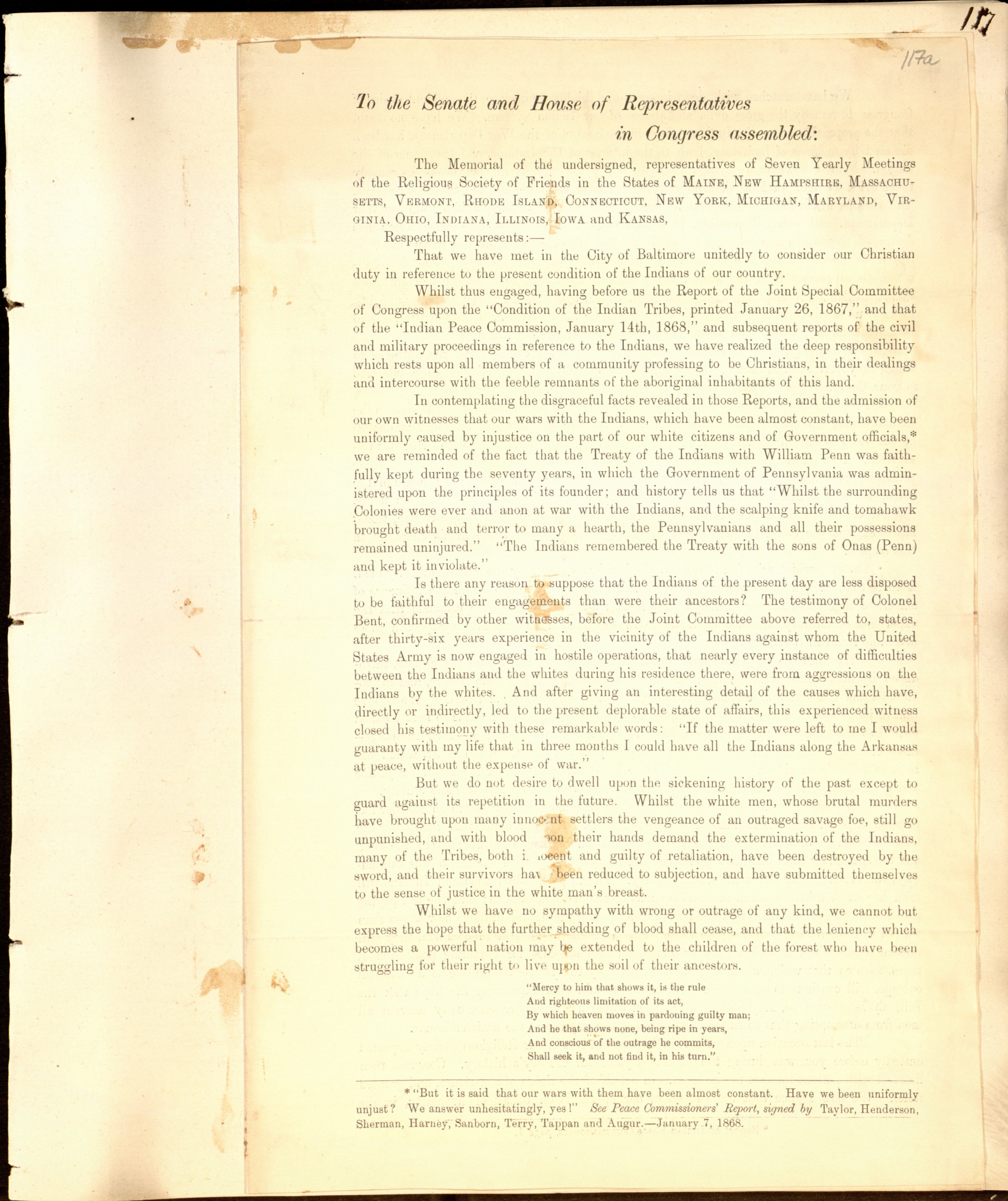in Congress
The Memorial of the undersigned, representatives of Seven Yearly Meetings
of the Religious Society of Friends in the States of MAINE, NEW HAMPSHIRE, MASSACHU-
SETTS, VERMONT, RHODE ISLAND, CONNECTICUT, NEW YORK, MICHIGAN, MARYLAND, VIR-
GINIA. OHIO, INDIANA, ILLINOIS, IOWA and KANSAS,
Respectfully represents:--
That we have met in the City of Baltimore
duty in reference to the present condition of the Indians of our country.
Whilst thus engaged, having before us the Report of the Joint Special Committee
of Congress
of the Indian Peace Commission, January 14th, 1868, and subsequent reports of the civil
and military proceedings in reference to the Indians, we have realized the deep responsibility
which rests upon all members of a community professing to be Christians, in their dealings
and intercourse with the feeble remnants of the aboriginal inhabitants of this land.
In contemplating the disgraceful facts revealed in those Reports, and the
admission of
our own witnesses that our wars with the Indians, which have
been almost constant, have been
uniformly caused by injustice on the part
of our white citizens and of Government
we are reminded of the fact that the Treaty of the Indians with William Penn
fully kept during the seventy years, in which the Government of Pennsylvania
istered upon the principles of its founder; and history tells us that Whilst the surrounding
Colonies were ever and anon at war with the Indians, and the scalping knife and tomahowk
brought to death and terror to many a hearth, the Pennsylvanians and all their possessions
remained uninjured.The Indians remembered the Treaty with the sons of Onas (Penn)
and kept it inviolate.
Is there any reason to suppose that the Indians of the present day are less
disposed
to be faithful to their engagements than were their ancestors? The
testimony of Colonel
Bent
after thirty-six years experience in the vicinity of the Indians against whom the United
States Army is now engaged in hostile operations, that nearly every instance of difficulties
between the Indians and the whites during his residence there, were from aggressions on the
Indians by the whites. And after giving an interesting detail of the causes which have,
directly or indirectly, led to the present deplorable state of affairs, this experienced witness
closed his testimony with these remarkable words: If the matter were left to me I would
guaranty with my life that in three months I could have all the Indians along the Arkansas
at peace, without the expense of war.
But we do not desire to dwell upon the sickening history of the past except to
guard against its repetition in the future. Whilst the white men, whose
brutal murders
have brought upon many innocent settlers the vengence of an
outraged savage for, still go
unpunished, with blood their hands
demand the extermination of the Indians,
many of the Tribes, both innocent
and guilty of retaliation, have been destroyed by the
sword, and their
survivors have been reduced to subjection, and have submitted themselves
to
the sense of justice in the white man's breast.
Whilst we have no sympathy with wrong or outrage of any kind, we cannot but
express the hope that the further shedding of blood shall cease, and that
the leniency which
becomes a powerful nation may be extended to the
children of the forest who have been
struggling for their right to live
upon the soil of their ancestors.
Mercy to him that shows it, is the rule
And righteous
limitation of its act,
By which heaven moves in pardoning guilty man;
And he that shows none, being ripe in years,
And conscious of the
outrage he commits,
Shall seek it, and not find it, in his
turn.
unjust? We answer unhesitatingly, yes! See Peace Commissioners' Report, signed by Taylor
Sherman

